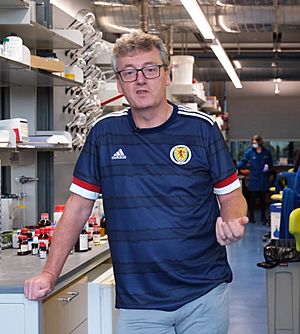David MacMillan facts for kids
Quick facts for kids
Sir David MacMillan
FRS FRSE
|
|
|---|---|

MacMillan in 2021
|
|
| Born |
David William Cross MacMillan
16 March 1968 |
| Citizenship | United Kingdom United States |
| Education | Bellshill Academy |
| Alma mater | University of Glasgow (BSc) University of California, Irvine (MSc, PhD) |
| Awards | Corday-Morgan medal Member of the National Academy of Sciences (2018) Nobel Prize in Chemistry (2021) |
| Scientific career | |
| Institutions | |
| Thesis | Stereocontrolled formation of bicyclic tetrahydrofurans and Enantioselective total synthesis of eunicellin diterpenes (1996) |
| Doctoral advisor | Larry E. Overman |
| Other academic advisors | Ernest W. Colvin David A. Evans |
| Doctoral students | Vy Dong, Tehshik Yoon, Robert R. Knowles |
Sir David William Cross MacMillan is a famous Scottish chemist. He is a professor of chemistry at Princeton University. From 2010 to 2015, he was also the head of the Chemistry Department there. In 2021, he won the Nobel Prize in Chemistry with Benjamin List. They won for developing something called "asymmetric organocatalysis". This is a special way to make chemical reactions happen. Sir David used his prize money to start a foundation named after his parents.
Early Life and Education
David MacMillan was born in Bellshill, Scotland, in 1968. He grew up in a nearby town called New Stevenston. His father worked in a steel factory, and his grandfather was a miner. He went to local public schools, New Stevenston Primary and Bellshill Academy. He often says that his Scottish education helped him become successful.
He studied chemistry at the University of Glasgow in Scotland. After that, in 1990, he moved to the United States. He started his advanced studies at the University of California, Irvine. There, he worked on creating new ways to make certain chemical structures. He earned his PhD in 1996.
What is Organocatalysis?
After getting his PhD, David MacMillan worked at Harvard University. He focused on making chemical reactions that create specific types of molecules.
In 1998, he started his own research at the University of California, Berkeley. Later, in 2000, he moved to Caltech. His team worked on new ways to control chemical reactions. In 2006, he became a professor at Princeton University.
Sir David MacMillan is known as one of the founders of organocatalysis. This is a way to speed up chemical reactions using small organic molecules. These molecules are made of carbon and other common elements. Before this, chemists often used expensive or harmful metals to speed up reactions.
In 2000, MacMillan designed special organic molecules. These molecules could help chemical reactions happen more easily. He also developed catalysts that could make "asymmetric" reactions. This means they could create more of a "left-handed" or "right-handed" version of a molecule. Many molecules can exist in two forms that are mirror images of each other, like your left and right hands. In medicine, often only one "handed" version of a molecule works correctly.
MacMillan's research group has made many breakthroughs in this area. They have used these new methods to create many complex natural products. These include important chemicals found in nature. His special catalysts, called imidazolidinone catalysts, are used in many different chemical reactions.
He also developed a method called photoredox catalysis. This uses light to help chemical reactions happen.
From 2010 to 2014, MacMillan was the first editor-in-chief of a science magazine called Chemical Science.
Awards and Special Recognitions
Sir David MacMillan has received many important awards for his work. In 2022, he was made a knight by the King of the United Kingdom. This was for his great contributions to chemistry and science.
Some of his other awards include:
- 2002 – Sloan Research Fellowship
- 2004 – Corday-Morgan medal
- 2012 – Elected a Fellow of the Royal Society (FRS)
- 2012 – Elected a member of the American Academy of Arts and Sciences
- 2013 – Elected a Fellow of the Royal Society of Edinburgh (FRSE)
- 2015 – Harrison Howe Award
- 2017 – Ryoji Noyori Prize
- 2018 – Elected a member of the National Academy of Sciences
- 2021 – Nobel Prize in Chemistry
- 2024 – Honorary PhD from North Carolina State University
See also
 In Spanish: David MacMillan para niños
In Spanish: David MacMillan para niños
 | Aaron Henry |
 | T. R. M. Howard |
 | Jesse Jackson |


